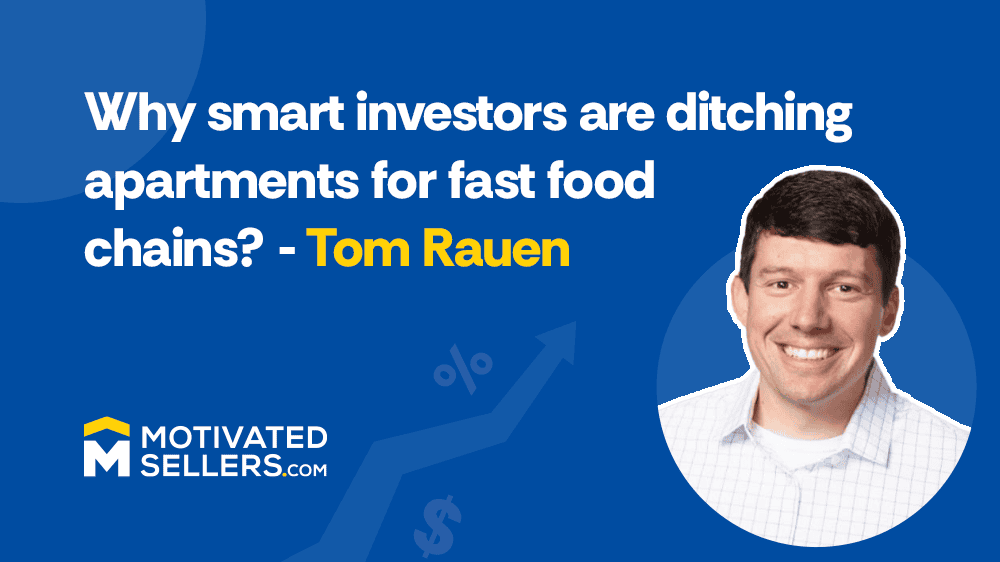

Tom Rauen is an industry leader in the commercial real estate world, but he's taking a distinctive approach. He's the founder of Rauen Capital, where he's carved out a niche investing in triple net lease properties with national tenants like Starbucks, Dollar Tree, and Sonic. Online, he is known as the Fast Food Landlord. His investment strategy is simple, with a focus on stability and recession resistance. He helps passive investors achieve consistent returns through his private fund.
In this conversation with Tom Rauen, we talk about:
I was the CEO of a web-based t-shirt company. The goal was to generate passive income, and real estate turned out to be the answer.
My first investment, a fourplex, was the worst nightmare of my life. With that property, I faced everything that could potentially go wrong with an investment property:
Eventually, we evicted the tenants and sold the building. It marked the end of my journey in the residential investment sector because the experience was absolutely crazy. I wanted to generate passive income without worrying about repairs or late payments.
Then came the “aha” moment while watching the movie The Founder. There was a quote when the CFO says, "We're not actually in the burger business; we're in the real estate business." That rang a bell, and I thought, "Wow, that is fascinating, how that works."
Then I met a man in his 80s who owned Dollar Generals and also real estate. He told me that if I drove down the road, I would see Starbucks, Panera, Taco Bell, and other brands—all of them owned by investors like him.
That was a big moment because, I had assumed that big brands owned their real estate, which is not true. Even McDonald’s owns only 35% of its real estate. It became clear that I wanted to focus on that type of real estate investing.
National franchises sign rental contracts for 10, 15, or 25 years. These tenants pay taxes, insurance, and maintenance, as is standard in a triple net (3N) lease. In a 3N lease, the tenant is responsible for insurance, taxes, and maintenance, while the landlord receives a fixed monthly rent. Triple net leases are often misunderstood which is why I am commonly referred to as the “Fast Food Landlord.” My other asset classes include industrial and medical real estate, in addition to fast food.
Have you ever driven by a Starbucks and seen a “For Sale” sign? That doesn’t happen.
That’s why this commercial real estate sector is so different from single-family or multifamily homes. You cannot find and compare many of these deals. Many leads are bought, sold, and traded off-market, sometimes directly from landlord to landlord.
We receive leads from accountants, lawyers, and attorneys. We also work with brokers and use a select few websites to source leads.
Underwriting depends on several factors, including the type of contract and whether the lease is single-tenant.
Panera Bread, Olive Garden, or McDonald’s are single-tenant because there is a single building on that piece of property. Large strip centers, grocery store–anchored strips, and shopping malls are considered multi-tenant. Regardless of tenancy, each deal must go through a rigorous underwriting process and analysis to see if it meets our criteria.
It pays to understand the business model of prospective tenants. Will it be a long-term contract?
Even with national franchises are not immune to tenant turnover. A big one that comes to mind is Kmart. Someone who owned a Kmart for a long time probably thought it would be great and last for a hundred years, yet it went out of business. The same happened with some other big-box retailers.
Hardee's has had a significant dip. One of the major national franchisees of Pizza Hut got into trouble, and we saw many Pizza Hut locations close.
Again, it’s about real estate, not the brand of the specific business. Your property should be in a high-traffic location—corners of main roads surrounded by dense populations. In that scenario, even if one tenant leaves, a new tenant will likely want to occupy the space because of the traffic. Always look for prime locations and strong demand.
Tom and his team evaluate Google reviews before signing contracts with a business. They assess management, the steady flow of customers, and high ratings. They also get to know the local manager and staff to understand what’s happening with the business.
“At times, we do a site visit. We will go eat there to get a feel for the place. We try to understand if this business will exist 10, 20, or 30 years down the road.”
Real estate investing is never 100% risk-free, even with big national franchises. The most important driving force behind a business is the leader or CEO. Look at the financial history, background, marketing efforts, and see who is running the business.
Rauen admits that he prefers betting on a 3N lease compared to a tenant in an apartment signing a six-month lease. All 10–20-year leases backed by a large company are relatively solid, though not entirely risk-proof.
Tom Rauen offers a cash-flow fund for real estate investors who want to earn passive income.
“We offer a fixed 10% return with monthly distributions. You don’t have to worry about tenants, lenders, or underwriting. You can invest funds to receive that monthly distribution.”
Publicly traded firms have good credit ratings, but they strictly go by numbers. Their board of directors is answerable to stakeholders. If they choose to pivot, they may suddenly close multiple stores. We see this happening with many franchises.
Then there are locally owned mom-and-pop businesses. These businesses don’t have a large structure or significant capital support, but they have the heart to make it work. I like both types of tenants, but I am a strong advocate for small, local business owners.
A good example would be nail salons, barber shops, and massage therapists. These small businesses create relationships in the community. They are deeply invested in the success of the business.
We search for properties with existing leases. We want to see an established customer base in a specific area. So, we don’t go out and search for these businesses. We only look for new tenants if a company relocates or moves its operations.
The triple net market will continue to attract investors, especially in the food, retail, and fashion sectors. There was a brief period when retail stores were closing down because e-commerce was cheaper. Now we see those same brands opening brick-and-mortar stores again because physical locations create connections with consumers. It’s all about the experience.
The physical vibe and the ability to interact with products in a live setting will become even more valuable as things shift further toward AI. People will long for that human connection.
If you had to start today from scratch with nothing but your experience and $100K, how would you do it?
The answer is simple. I would invest alongside a good operator for a couple of years. When I invest with other operators, I earn both ROI and education, which is invaluable. Find an asset class, an experienced operator, and an investor network, and learn the ropes that way.
You can learn a lot by reading blogs or watching YouTube, but success happens through action. You’ll see many people wanting to invest in real estate but waiting for the right time, until five years pass without any investment.
The biggest advice is to get in the game and start. Start with the first deal. You may lose money along the way, but that can be the cost of education. Start small, get your feet wet, and get off the fence. From there, you’ll really start to learn, because being in the game is different from watching from the sidelines.
So my biggest piece of advice would be: get off the sidelines, get in the game, and start. You may lose money along the way, and sometimes the cost of education is losing a little bit. Start small, get your feet wet, and get off the fence. Once you’re in, that’s when you really start to learn, because nothing beats experience. The real magic happens once you begin compounding your investments.
We keep looking for deals with the Fast Food Landlord brand. We teach others the frameworks that grew our portfolio from zero to over $72 million in assets under management.
On a personal note, I'm an ultrarunner. I enjoy running 50-mile and 100-mile races and pushing myself to see what’s possible on a physical, mental, emotional, and endurance level. I have a few races in mind that I’d like to complete. When I push myself personally through these endurance events, it strengthens my professional performance.
With 1-800-T-Shirts, I was looking for a way to create some media buzz, and I always had a bucket-list goal of breaking a Guinness World Record. So I looked up Guinness World Records related to t-shirts, and one was for wearing the most t-shirts at once. I broke the record by wearing 247 t-shirts at one time.
That ends our conversation with Tom Rauen. You can connect with him on Instagram @fastfoodlandlord.